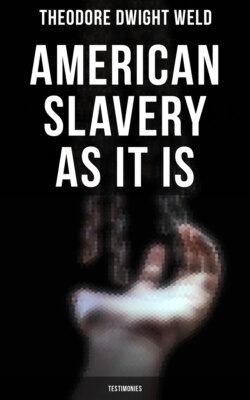Читать книгу American Slavery as It is: Testimonies - Theodore Dwight Weld - Страница 6
На сайте Литреса книга снята с продажи.
Narrative of Rev. Horace Moulton
ОглавлениеTable of Contents
Mr. Moulton is an esteemed minister of the Methodist Episcopal Church, in Marlborough, Mass. He spent five years in Georgia, between 1817 and 1824. The following communication has been recently received from him.
MARLBOROUGH, MASS.,
Feb. 18, 1839.
DEAR BROTHER--
Yours of Feb. 2d, requesting me to write out a few facts on the subject of slavery, as it exists at the south, has come to hand. I hasten to comply with your request. Were it not, however, for the claims of those "who are drawn unto death," and the responsibility resting upon me, in consequence of this request, I should forever hold my peace. For I well know that I shall bring upon myself a flood of persecution, for attempting to speak out for the dumb. But I am willing to be set at nought by men, if I can be the means of promoting the welfare of the oppressed of our land. I shall not relate many particular cases of cruelty, though I might a great number; but shall give some general information as to their mode of treatment, their food, clothing, dwellings, deprivations, &c.
Let me say, in the first place, that I spent nearly five years in Savannah, Georgia, and in its vicinity, between the years 1817 and 1824. My object in going to the south, was to engage in making and burning brick; but not immediately succeeding, I engaged in no business of much profit until late in the winter, when I took charge of a set of hands and went to work. During my leisure, however, I was an observer, at the auctions, upon the plantations, and in almost every department of business. The next year, during the cold months, I had several two-horse teams under my care, with which we used to haul brick, boards, and other articles from the wharf into the city, and cotton, rice, corn, and wood from the country. This gave me an extensive acquaintance with merchants, mechanics and planters. I had slaves under my control some portions of every year when at the south. All the brick-yards, except one, on which I was engaged, were connected either with a corn field, potatoe patch, rice field, cotton field, tan-works, or with a wood lot. My business, usually, was to take charge of the brick-making department. At those jobs I have sometimes taken in charge both the field and brick-yard hands. I have been on the plantations in South Carolina, but have never been an overseer of slaves in that state, as has been said in the public papers.
I think the above facts and explanations are necessary to be connected with the account I may give of slavery, that the reader may have some knowledge of my acquaintance with practical slavery: for many mechanics and merchants who go to the South, and stay there for years, know but little of the dark side of slavery. My account of slavery will apply to field hands, who compose much the largest portion of the black population, (probably nine-tenths,) and not to those who are kept for kitchen maids, nurses, waiters, &c., about the houses of the planters and public hotels, where persons from the north obtain most of their knowledge of the evils of slavery. I will now proceed to take up specific points.
